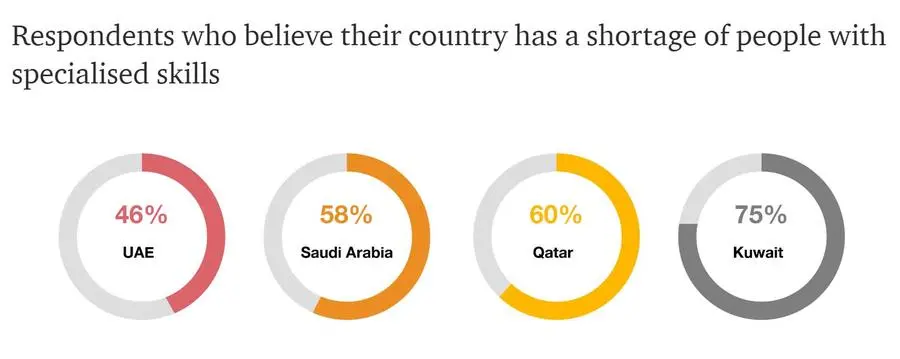PHOTO
Countries in the Gulf, which have always been considered top destinations for expatriates looking for greener pastures, have some of the highest shortages of skilled workers in the Middle East, according to a new report.
PwC conducted a survey of more than 1,500 employees across the Middle East, in which three quarters (75 percent) of respondents in Kuwait and 60 percent in Qatar said their country has a shortage of people with specialised skills.
In Saudi Arabia, the majority (58 percent) of respondents acknowledged that there is a skilled labour shortage in the kingdom, while 46 percent in the UAE shared the same view.


Workers that have specialized skills are often more sought after compared to their peers that have only general skills. A shortage means there are less skilled candidates applying for roles than vacancies.
Addressing the skills shortage
With the shortage, employers in the region recognize the importance of retaining staff with skills. In PwC’s survey, 38 percent of respondents across the Middle East, slightly more than the global average, said their companies had increased salaries as a retention strategy to retain skilled talent.
“This may reflect the increasing tendency of employers, especially in Saudi Arabia and the UAE, to raise salaries rather than hire scarce and therefore expensive foreign talent to address skills and labour shortages,” PwC said in its report.
Businesses are also taking other steps to address the shortage, with nearly half (47 percent) of respondents saying that their companies are upskilling their staff, supporting workers with physical and mental well-being (33 percent) and automating and/ or enhancing work via technology (32 percent).
Besides skills shortage, organisations in the region also need to address staff turnover. About a third (30 percent) of workers in the region said they are extremely or very likely to look for a new job in the next year.
The proportion of workers likely to quit their jobs in the region is higher than the global average of 19 percent. Gen Z and millennials in the Middle East are the ones that are more likely to quit.
(Reporting by Cleofe Maceda; editing by Seban Scaria )





















